What can the East Midlands mayor do for transport?
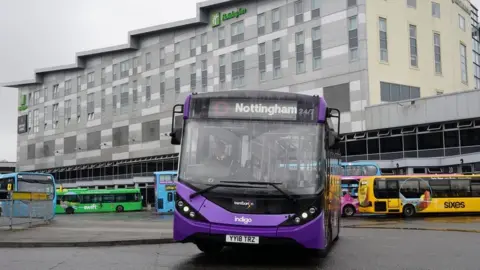 BBC
BBCDerbyshire and Nottinghamshire voters will go to the polls in a historic election on Thursday to choose an East Midlands mayor.
One of the big powers the mayor will have is the ability to overhaul public transport.
But how will they do it?
The mayoral role, which will cover Derby, Nottingham, Derbyshire and Nottinghamshire, will see the area receive £1.14bn over the next 30 years.
It works out at a fixed sum of £38m a year.
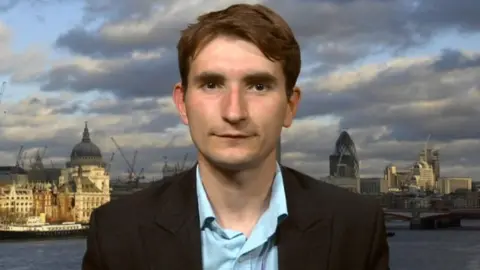
Paul Swinney, research and policy director at think-tank Centre for Cities, believes the successful candidate will be able to take real control over transport.
He said the bus network under Transport for London (TfL) was often seen as the ambition for a bus service. It was the only area that survived the deregulation process under former Prime Minister Margaret Thatcher in the 1980s.
"London has had control of their buses for many decades and now other mayors in the country are starting to take this up," Mr Swinney said.
"What this will allow the mayor to do is set where the buses go, set the prices and then coordinate those services with other public transport services like rail and the tram in Nottingham.
"If done right, this should mean it will be better to use, more frequent to use and hopefully more people out of the car and on to public transport."
This is usually the first step many other mayors have taken when setting out plans to improve buses.
It allows political leaders in the region alongside the mayor to work more closely with bus operators. This could include improving ticketing systems, routes, and frequency of services.
Implementing an enhanced partnership has also allowed other areas to be able to bid for more government funding to encourage bus use.
But critics say the system is not radical enough and leaves too much onus on private bus operators to improve things.
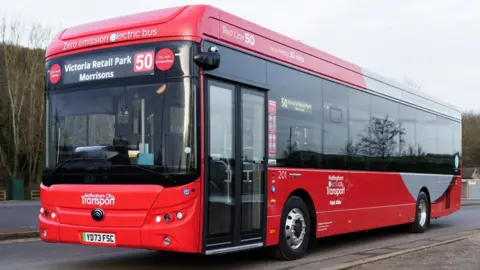 Nottingham City Transport
Nottingham City TransportApart from Nottingham, huge swathes of Derbyshire and Nottinghamshire are served by private operators.
Mr Swinney said that it was hard to have "any degree of coordination" between private operators, and it could lead to "too much competition" on one route and often more rural, less profitable, ones lose out.
He added bus franchising allowed the mayor to set where the bus routes would be and then private companies came in and bid to run them.
With the extra funding, the mayor will be able to improve bus services without having to solely rely on private operators to make the investment, he said.
Municipal bus company
This is the system that Nottingham operates under. It is broadly popular and Nottingham City Transport (NCT) has won a number of customer satisfaction awards.
The city, along with four other areas, operate under a municipal bus company - this is a bus operator owned by a local government authority.
But Mr Swinney said going down this route was "not an easy option" for areas in England at the moment.
The Bus Services Act 2017 expressly prohibits the creation of new municipal bus companies. Yet areas with municipally-owned bus companies enjoy bus journeys (per head of population) well above the English average.
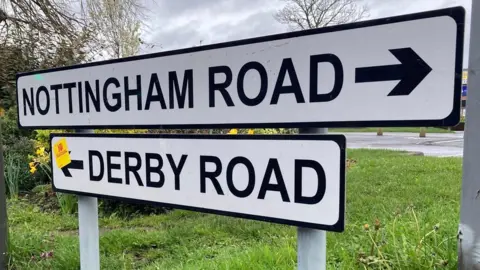
Mat Danks, a former advisor to mayoral candidate Andy Street in the West Midlands, said voters would have to be patient to see real change.
"Transport will be the flagship policy, no doubt about it," he said. "But I would stress that radical changes to the bus network, for example, will not come quickly.
"It's taken Andy Burnham [in the north west] about eight years to get bus franchising off the ground. Because they were the first, it may be quicker in the future, but this is no overnight thing."
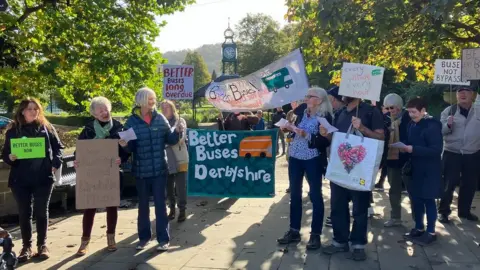
Chrissy Grocott, a campaigner with the Better Buses Derbyshire group, began to get more active on the issue after finding bus timetable information in her area was often not available.
"The lack of information, this is standard stuff it needs to improve," she said.
"I just hope the right person will be elected to that position... the buses need to be better integrated with the trains and other transport systems.
"People need to be fully aware where buses can take people with proper punctual and reliable services... it's not best practice everywhere here in Derbyshire."
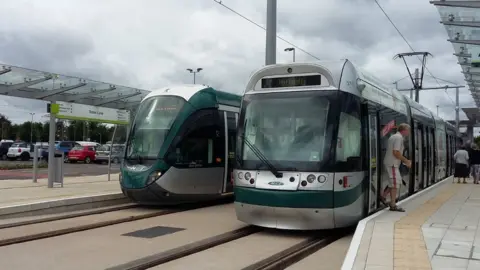
David Thornhill, chair of Sustainable Transport Nottingham, says the city is lucky to have a tram - but it needs extending.
"We don't have that big a system," he said. "For a tram system to work, it has to go to more or less every corner of the conurbation, and Nottingham currently still depends very much on buses."
He also said extensions should be considered to Gedling and along the A453 corridor beyond Clifton.
"There's been this obsession with competition. Competition can sometimes work but when it comes to public transport, you've got to look more at integrating it, and ticketing is key," he added.

The candidates (in alphabetical order):
- Frank Adlington-Stringer (Green Party)
- Ben Bradley (Conservatives)
- Alan Graves (Reform UK)
- Matt Relf (Independent)
- Helen Tamblyn-Saville (Liberal Democrat)
- Claire Ward (Labour)

Follow BBC Derby on Facebook, on X, or on Instagram. Send your story ideas to [email protected] or via WhatsApp on 0808 100 2210.
